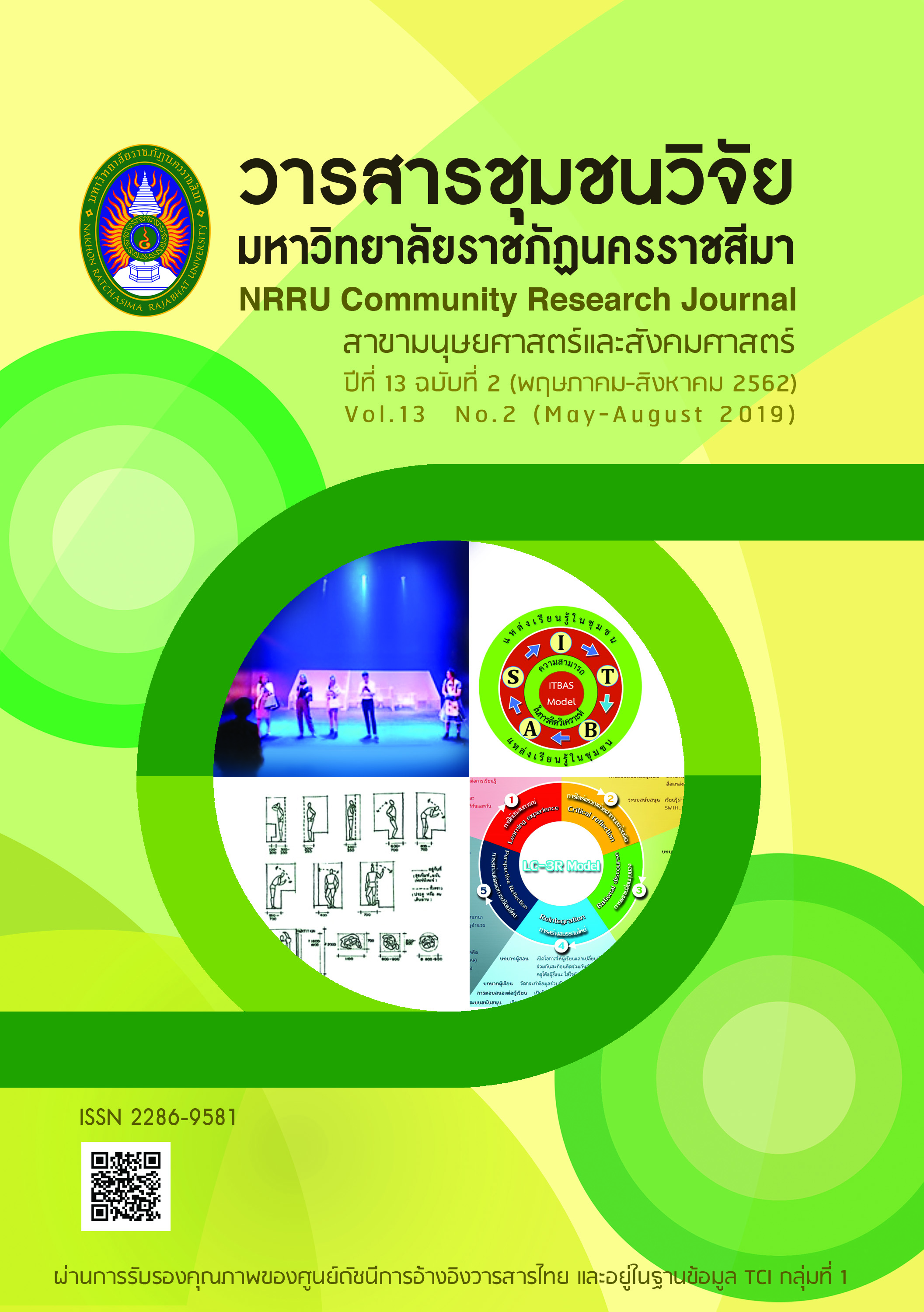การพัฒนาการจัดการเรียนรู้ตามรูปแบบการสืบเสาะที่ขับเคลื่อนด้วยกลวิธีการโต้แย้งเพื่อส่งเสริมความสามารถในการคิดเชิงวิพากษ์ทางวิทยาศาสตร์ ของนักเรียนชั้นมัธยมศึกษาปีที่ 5 เรื่อง กรด-เบส
DOI:
https://doi.org/10.14456/10.14456/nrru-rdi.2019.40คำสำคัญ:
การจัดการเรียนรู้ตามรูปแบบการสืบเสาะที่ขับเคลื่อนด้วยกลวิธีการโต้แย้ง, ความสามารถในการคิดเชิงวิพากษ์ทางวิทยาศาสตร์, กรด-เบสบทคัดย่อ
งานวิจัยปฏิบัติการเชิงคุณภาพนี้มีวัตถุประสงค์เพื่อศึกษาแนวทางการจัดการเรียนรู้โดยใช้รูปแบบการสืบเสาะที่ขับเคลื่อนด้วยกลวิธีการโต้แย้งที่ส่งเสริมความสามารถในการคิดเชิงวิพากษ์ทางวิทยาศาสตร์ เรื่อง กรด-เบส และศึกษาผลของความสามารถในการคิดเชิงวิพากษ์ทางวิทยาศาสตร์ เรื่อง กรด-เบส ของนักเรียนที่เรียนด้วยการเรียนรู้ตามรูปแบบการสืบเสาะที่ขับเคลื่อนด้วยกลวิธีการโต้แย้ง กลุ่มศึกษา คือ นักเรียนห้องเรียนพิเศษวิทยาศาสตร์ชั้นมัธยมศึกษาปีที่ 5 ภาคเรียนที่ 2 ปีการศึกษา 2561 โรงเรียนขนาดใหญ่แห่งหนึ่งในจังหวัดพิษณุโลก จำนวน 31 คน เครื่องมือวิจัยประกอบด้วย 1) แผนการจัดการเรียนรู้ จำนวน 3 แผน 2) แบบบันทึกการสะท้อนผลการจัดการเรียนรู้ 3) รายงานผลการสำรวจตรวจสอบ 4) ชิ้นงานโต้แย้งชั่วคราว และ 5) แบบวัดความสามารถในการคิดเชิงวิพากษ์ทางวิทยาศาสตร์ ดำเนินการโดยใช้กระบวนการวิจัยเชิงปฏิบัติการ 3 วงจรปฏิบัติการ วิเคราะห์ข้อมูลโดยการวิเคราะห์เนื้อหา โดยมีความน่าเชื่อถือของงานวิจัยเชิงคุณภาพจากการตรวจสอบสามเส้าด้านแหล่งข้อมูลและด้านวิธีการ
ผลการวิจัยพบว่า แนวทางควรมีลักษณะดังนี้ การยกตัวอย่างสถานการณ์จริงที่นักเรียนพบเห็นในชีวิตประจำวัน การใช้สื่อที่มีความหลากหลาย และควรนำเสนอประเด็นที่ต้องชัดเจน ควรเปิดโอกาสให้นักเรียนได้ออกแบบและเลือกวิธีการเก็บหรือวิเคราะห์ข้อมูลด้วยตัวเอง แล้วนำข้อมูลที่ได้มาสร้างข้อโต้แย้งชั่วคราวจะทำให้นักเรียนสามารถแยกแยะได้ว่าเป็นข้อโต้แย้งใด ครูและนักเรียนควรร่วมกันอภิปรายและสรุปข้อมูล การให้นักเรียนเขียนรายงาน ประเมินรายงานของเพื่อน และปรับปรุงรายงานของตนเอง และนักเรียนมีระดับความสามารถในการคิดเชิงวิพากษ์ทางวิทยาศาสตร์ในระดับมากทั้ง 3 ด้าน คือ ด้านทักษะการนิยามสูงที่สุด ร้อยละ 77.42 รองลงมา คือ ด้านทักษะการตัดสินข้อมูล และด้านทักษะการอ้างอิงในการแก้ไขปัญหาและสรุปอย่างสมเหตุสมผล ร้อยละ 67.74 และ 61.29 ตามลำดับ
References
Chaimongkol, P. (2017). Development of Scientific Reasoning Ability in Stoichiometry Unit Using Argument-Driven Inquiry Instructional Model. Journal of Research Unit on Science, Technology and Environment for Learning, 8(1), 27-40. (in Thai)
Gilbert, J. K. (2006). On the nature of context in chemical education. International Journal of Science Education, 28(9), 957-976.
Kijkuakul, S. (2014). Scientific learning management: The guide for teachers in 21st century. Petchaboon : Chunladit printing Press. (in Thai)
Saengson, J. (2015). The development of the interpret data and evidence scientifically competency in photosynthesis topic for grade 11 students using argument-driven inquiry model. A Thesis for Master of Education degree in Biology program, Naresuan University, Phitsanulok. (in Thai)
Sampson, V., & Gleim, L. (2009). Argument-driven inquiry to promote the understanding of important concepts and practices in biology. The American Biology Teacher, 71(8), 465-472.
Sampson, V., Grooms, J., & Walker, J. (2009). Argument-driven inquiry. The Science Teacher, 76(8), 42-47.
Sampson, V., Grooms, J., & Walker, J.P. (2011). Argument-driven inquiry as a way to help students learn how to participate in scientific argumentation and craft written arguments: An exploratory study. Science Education, 95(2), 217-257.
Suwattanapong et al. (2016). Academic Management to Enhance Critical thinking Skills of Secondary School Students. Journal of Education Studies, 44(4), 280-293. (in Thai)
Tansuwannond, C. (2017). Critical Thinking, Understanding and Collaboration, Creative Thinking, Media Literacy and Conducting Ethical Rules : Key Traits and Skills for Thai Youth in the 21st Century. Suratthani Rajabhat Journal, 4(2), 1-20. (in Thai)
Upienpong, P. (2009). Repellent using behavior among Chikungunya in Narathiwat province. A Thesis for Master of Public Health degree, Burapha University, Chonburi. (in Thai)
Walker, J. P., & Sampson, V. (2013). Learning to argue and arguing to learn: Argument‐driven inquiry as a way to help undergraduate chemistry students learn how to construct arguments and engage in argumentation during a laboratory course. Journal of Research in Science Teaching, 50(5), 561-596.
Walker, J. P., Sampson, V., Grooms, J., Anderson, B., & Zimmerman, C. O. (2012). Argument-driven inquiry in undergraduate chemistry labs: The impact on student’s conceptual understanding, argument skills, and attitudes toward science. Journal of College Science Teaching, 41(4), 74-81.
Yongthai, J. (2018). Development of critical thinking skills and 21st Century. Journal of Educational Administration, Silpakorn University, 9(2), 344-356. (in Thai)



